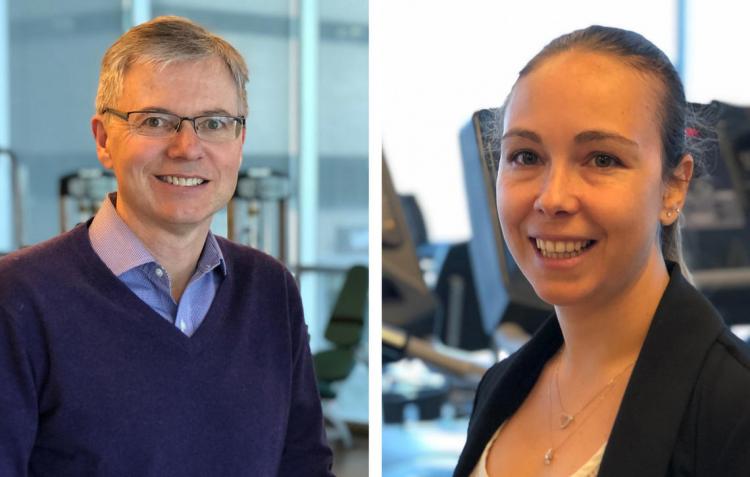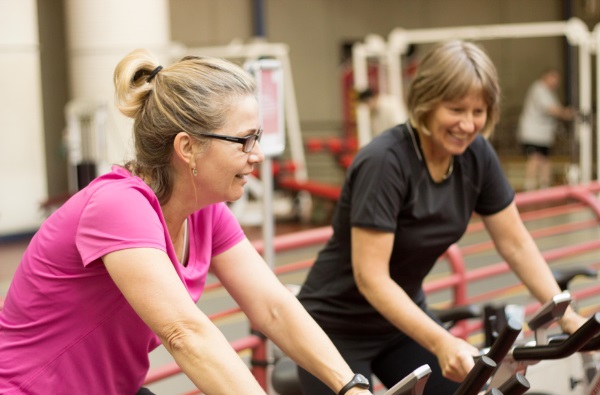Author: Brittany DeAngelis, O'Brien Institute for Public Health
There's no such thing as a panacea when it comes to maintaining brain health as we age, but exercise might come close according to a study published in the May 13, 2020, online issue of Neurology, the medical journal of the American Academy of Neurology. The study suggests older adults, even couch potatoes, can perform certain thinking and memory tests at the same level as someone four to six years their junior after just six months of aerobic exercise.
"Our study showed that six months' worth of vigorous exercise may pump blood to regions of the brain that specifically improve your verbal skills as well as memory and mental sharpness," says Dr. Marc Poulin, PhD, who is a member of the O'Brien Institute for Public Health, and a professor with the Cumming School of Medicine (CSM) departments of Physiology and Pharmacology, and Clinical Neurosciences, as well as the Faculty of Kinesiology at the University of Calgary.
"Since cognitive abilities would be expected to decrease due to normal aging, to have these types of changes is exciting."
Participants in Poulin's Brain in Motion study were people from the Calgary area, generally healthy but not very active, between 50 and 83 years old with no cognitive complaints. They were given thinking and memory tests at the start of the study, as well as an ultrasound to measure blood flow in the brain. Physical testing was repeated at three months, and thinking and physical testing repeated at the end of the six months.

Marc Poulin and Veronica Guadagni are authors of the Brain in Motion study, which was published May 13 in Neurology. Photo by Kelly Johnston
At the beginning, and again at the end of the program, the participants' average peak blood flow to the brain was measured using ultrasound. On average, blood flow increased by 2.8 per cent over the six months. The increase in blood flow was associated with a number of modest but significant improvements in aspects of thinking that usually decline as we age.
Verbal fluency, which tests how well you can retrieve information, increased by 2.4 per cent, equivalent to being five years younger. Participants' recall of words from a list improved by 2.6 per cent, equivalent to being four years younger, while an evaluation of executive functioning, which examines more complex aspects of reasoning, showed an increase of 5.7 per cent, performing like adults almost six years younger.
The program consisted of a supervised aerobic exercise program held three days a week. As participants progressed through, they increased their workout from an average of 20 minutes a day to an average of at least 40 minutes. In addition, people were asked to work out on their own once a week.
Preparing for an aging population
Canadians are getting older. According to projections by the Federal government, by 2030 one in four Canadians will be over the age of 65.
As this population grows, an increasing number of Canadians will be at risk for diseases of the brain such as Alzheimer's and other dementias, says Dr. Veronica Guadagni, PhD, a postdoctoral associate in the Department of Physiology and Pharmacology, and study author.
"Exercise has been shown to be the only effective treatment to slow down or prevent the progression of dementia," says Guadagni. "If you want an effective, low-cost and very safe strategy that people can implement to improve their life and prevent or slow down cognitive decline, this is it."

Brain in Motion study participants completed an aerobic exercise program, exercising four days per week, up to 40 minutes per session. Photo Courtesy Brain in Motion
Like many aging adults, Atsuko McDonald began to notice she wasn't as agile as she once had been. Navigating a set of stairs in her home was becoming a challenge for the then 70-year-old, and along with her husband, Ron, she was concerned about her declining levels of physical activity.
So when they came across an ad in the paper looking for older adults to take part in an aerobic exercise program, they decided to sign up. Five years later they are still exercising multiple times a week, and say they are committed to maintaining their more active lifestyle as long as they can.
"I was physically deteriorating. I used to say oh it's just my age, it cannot be helped," says McDonald. "But I have experienced so much benefit from this program the stairs are not a problem anymore."
Although it wasn't her original reason in signing up for the study, McDonald, now 75, has motivation to keep her brain in top shape as well her weekly card game of bridge.
Keeping active in the time of COVID-19 and beyond
The conditions that enabled the Brain in Motion study have changed. Gyms are closed. Gathering together to exercise is not an option as we continue to physically distance to stop the spread of COVID-19. But that hasn't stopped the McDonalds.
"We used to go to the gym in the mornings, but now we've started walking," says Ron McDonald. "First thing, we get up, go out and do 5,000 to 8,000 steps."
Guadagni says ways to stay active during the pandemic are accessible to many people.
Fast-paced walking, jogging, dancing, or any activity that would not allow you to sing or talk while you're doing it would be beneficial to promote and maintain brain health..
Next, Poulin and his team plan to work with community and government partners to implement physical activity strategies into the community.
"We see potential for impact on aging brain care in general, and also on the dementia care pathway," he says.
The Brain in Motion study was supported by the Canadian Institutes of Health Research, The Brenda Strafford Foundation Chair in Alzheimer Research, and the Alzheimer Society Research Program (ASRP) Postdoctoral Fellowship.
Poulin's lab is now recruiting for the Brain in Motion II study, looking for adults age 50-80 who are at increased risk of Alzheimer's disease and related dementias. For more information, call the study coordinator at 403-210-7315 or reach out by email at bimstudy@ucalgary.ca,
Marc Poulin,is a professor who holds a joint appointment in the Faculty of Kinesiology and at the Cumming School of Medicine in the departments of Physiology and Pharmacology, and Clinical Neurosciences. He is a member of the O'Brien Institute for Public Health, Hotchkiss Brain Institute and Libin Cardiovascular Institute at the CSM and holds the Brenda Strafford Foundation Chair in Alzheimer Research.
Brain and Mental Health strategy
Led by the Hotchkiss Brain Institute, Brain and Mental Health is one of six research strategies guiding the University of Calgary toward its Eyes High goals. The strategy provides a unifying direction for brain and mental health research at the university and positions researchers to unlock new discoveries and treatments for brain health in our community.









